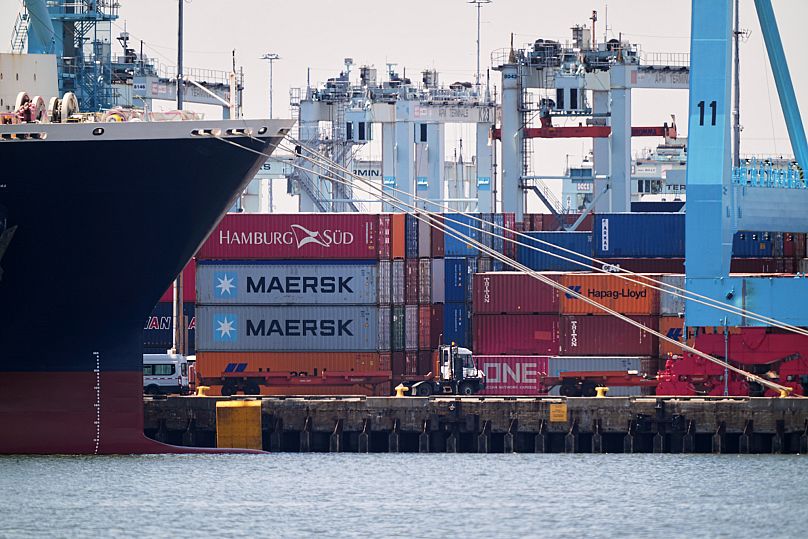Trump's Power Play: US Snags 10% Equity in Intel, Shaking Up Tech

In an extraordinary intervention into corporate America, the U.S. government has secured a 9.9% stake in the struggling Silicon Valley pioneer Intel. Announced by President Donald Trump, this deal converts government grants into an equity share, making the U.S. government one of Intel's largest shareholders. The acquisition, valued at $8.9 billion, involved the purchase of 433.3 million shares of non-voting stock at $20.47 apiece, a discount from Friday's closing price of $24.80. This immediately resulted in a paper gain of $1.9 billion for the U.S. government.
The funding for this significant stake primarily comes from the conversion of previously pledged and issued funds. Approximately $5.7 billion in unpaid grants from the Biden-era CHIPS and Science Act, designed to foster domestic manufacturing of computer chips, contributed to the investment. An additional $3.2 billion was sourced from the Secure Enclave program. While the CHIPS Act was initially viewed as a 'needless giveaway' by the Trump administration, the current administration aims to profit from the funding, with Commerce Secretary Howard Lutnick stating, "It’s obvious that it’s the right move to make."
This remarkable turn of events comes as Intel, a Santa Clara, California-based company, grapples with significant challenges. The chipmaker has been in a prolonged period of decline, having reported losses exceeding $22 billion since the end of 2023, including an annual loss of $18.8 billion in 2024—its first since 1986. Intel has shed over 20,000 workers as part of its efforts to rebound from years of missteps. Its current market value stands at about $108 billion, a mere fraction of the $4.3 trillion valuation of chip kingpin Nvidia, and it has lost substantial market share to competitors like TSMC and Advanced Micro Devices (AMD).
The deal also represents a dramatic shift in the relationship between President Trump and Intel's current CEO, Lip-Bu Tan. Just weeks prior, Trump had publicly demanded Tan's resignation, citing national security concerns over his past investments in Chinese companies as a venture capitalist. However, following Tan's public letter professing allegiance to the U.S. and a subsequent meeting at the White House, Trump backed off, hailing Tan as a "highly respected" CEO. Tan, who took the helm in March, has been tasked with revitalizing the American chipmaking icon, and he applauded Trump for "driving historic investments in a vital industry," pledging to reward the administration's faith in Intel.
The Trump administration's rationale for the stake aligns with its broader economic agenda, particularly the push to bring manufacturing back to the U.S. By lessening the country’s dependence on chips produced overseas, the president believes the U.S. can better maintain its technological lead over China, especially in the race to develop artificial intelligence. This intervention is also seen as a way for the government to gain a financial return on funds initially allocated for industry incentives.
Despite the government's backing, the deal has drawn significant criticism. Critics view it as a troubling "cross-pollination" between the public and private sectors, raising concerns about potential harms to the U.S. tech industry. Scott Lincicome of the Cato Institute warned that it could pressure other tech companies to favor Intel's chips to curry political favor, negatively impacting U.S. tech leadership and the broader economy. Money manager Nancy Tengler also expressed worries about government meddling in Intel's business, stating, "I don’t care how good of businessman you are, give it to the private sector and let people like me be the critic and let the government get to the business of government."
While rare, government intervention as a significant shareholder is not unprecedented; a notable example is the nearly $50 billion injection into General Motors during the 2008 Great Recession, which ultimately resulted in a $10 billion loss for the government. This Intel deal also coincides with other extraordinary Trump administration interventions, including requiring Nvidia and AMD to pay a 15% commission on H20 chip sales in China for export licenses, the Pentagon becoming the largest shareholder in MP Materials, and the U.S. government securing a "golden share" with veto rights in the Nippon Steel/U.S. Steel acquisition.
Looking ahead, Intel faces an uphill battle to revive its loss-making foundry business. Analysts suggest that while government support offers some breathing room, the company still needs to raise substantial capital, catch up technologically with TSMC, and attract customers to its new factories. The agreement also includes a five-year warrant for an additional 5% of Intel stock at $20 a share, which the U.S. can exercise if Intel loses control of its foundry operations, underscoring the high stakes involved in turning the company around.
You may also like...
Liverpool Crisis? Reds Face Scrutiny After Consecutive Defeats

Liverpool faces scrutiny after two straight losses, with BBC Sport expert Chris Sutton highlighting their defensive vuln...
Man Utd Managerial Shake-Up Looms: Amorim Speculation Ignites Southgate Concerns

Manchester United faces a managerial dilemma as Ruben Amorim's position comes under scrutiny amidst a dire start to the ...
Bone Lake: Twisted Thriller Sparks Critical Debate on Erotic Horror

Mercedes Bryce Morgan's <em>Bone Lake</em> explores the 'sexy horror' genre, blending psychological manipulation and bla...
Country Power Couple Kane & Katelyn Brown Land Lifetime Christmas Film Deal Based on Hit Song!

Country music stars Kane and Katelyn Brown are making their debut as television executive producers for Lifetime's holid...
Mariah Carey Breaks Silence On Eminem Feud & ‘8 Mile’ Rumors!

Mariah Carey recently discussed her long-standing feud with Eminem, confirming rumors that he once asked her to play his...
Coronation Street Shocker: Beloved Star Sally Ann Matthews Bids Farewell to Soap

Coronation Street bids farewell to two prominent stars as Sally Ann Matthews makes an emotional exit as Jenny Connor aft...
Tems Shatters Records: First Nigerian Female Artist to Hit 10 Million US Units!

Tems has made history as the first female Nigerian artist to sell over 10 million units of a single in the U.S. with her...
Autumn's Hottest High Street Bags Revealed: Top Trends Starting from Just £20!

For Autumn/Winter 2025, bags transcend their functional role to become the main event in fashion, with a diverse array o...


